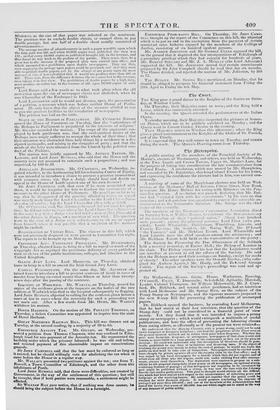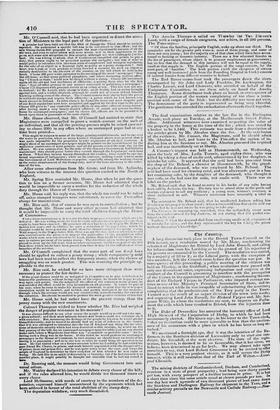On Wednesday, Messrs. Grote, flume, Warburton, Rowring, O'Connell, Ewart, T.
Duncombe, Seholefield, Aglionby, Marshall, Leader, Colonel Thompson, Sir William lloleswortle Mr. J. Craw. furd, Dr. Birkheck, and several other gentlemen, had an interview with Lord Melbourne and Mr. Spring Rice, on the subject of the Penny Stamp on Newspapers, and the rigorous measures proposed in the new Stamp Bill for preventing the publication of unstatnped papers.
Dr. Birkbeck opened the business, by reminding Lord Melbourne, that he had stated at their last interview, that the question of the Stamp-duty vould not be considered in a financial point of view merely. Yet they found that it was intended to impose a penny stamp on newspapers ; which would extinguish a multitude of useful publications, and have the effect of preventing the labouring classes from seeing others, as effectually as if the present tax were retained lie understood that the Morn;ny Chronicle, with a penny stamp, could not be sold under fourpeuce or feints:Hee hallpenny ; and that the proprietors of the Times were at the present moment inclined not to reduce their price below fivepence. Whether the price were fourpence, tivepence, or sevenpence, newspapers of that class would still remain as inaccessible to a large portion 01 the community as they are at the present moment. Ile could not understand why this description of literature should be poor tically prohibited to auy class of industrious and deserving men. If the object of retaining the penny were merely to defray the cost of postage, he would say leave the public ou that head to take care of themselves. Newspapers could be carried much more cheaply by private agencies all over the country than by the Post-office ; and it was unjust to tax local newspapers for a benefit which they did not require, and of which even all those who did require. could not, under existing Post-office arrange- ments. always avail themselves. The deputation were anxious to propose as a sub- stitute for the proposed stamp-duty of one penny on all newspapers, an optional stamp, conferring freedom of postage; so that newspapers not requiring to be circulated by post might be published without a stamp, as was now the case with the Literary Gazette and similar publications. 'finis plan he thought would obviate all the difficul- ties which had been started with respect to the inconvenience of collecting pence and halfpence at the receiving-houses. lie could not consider that the peony could be retained for mere financial objects. It would produce (excluding the expense of postage) not more than 100,0001.; and one of the members of the Administration bad stated but lately. that a sum of 160,0001. was one which ought not to stand in the way of any measure of public utility.
Mr. O'Connell said, that he had been requested to direct the atten. Lion of Ministers to the legal part of the question-
♦ promise had been held out tbet the 60th of George the Third should be entirely repeated. lie understood a specific bill was to be inovelneml to that effect ; but the sew Stamp-duties Bill proposed to reenact the must objectionable features of all the wad laws, and even to enact others stall more severe. new in their application to the press. and some new altogether to this country, although not new (uultall-ily) to Ire. land. Ile was willing to admit, that if Government compelled one person to pay a duty. that person ought to be protected against the smuggler ; but was it wise or sound policy to iutioduce this immense mass of complicated and stringent legislation, for the sake of an object in a financial light so paltry as a penny stamp-duty 1 Still more, ens it just.or even prudent, to bring fimaard a measure for such an object so entirely destructive to the liberties Of the country, as the bill which he held iu his hand. Clause 166 gave a ider extension to the me: ningof the word " simper " than the old laws; so that many'edificel pamphlets, and others discussing matters affect log " Church or State," would now he illegal a ithout a stamp. Clause 16$ introduced again all the old and bad machinery of 1111111,LI iti ; requiring them also. fur the first time," from all other persous in any manlier concerned in publishing a newspaper." Clause 171 dispenses with personal service in an action at law. This law was not new to Ireland; fur Mr. Laren, *Idle /assert in Italy. on ill health, had an action brought against him. and a verdict obtained. although he could nut of course defend himself, knowing nothing even of the charge. The Commissioners were also to !MCC the pout-, to withhold stamps and require fresh affidavits—a poser which he II id known very much abused in Ireland. lu other CILIUM'S he found the worst noel moat despotic part of our regulations were here reenacted and applied for the first time to the press. Clause 239 gives to " any constable. policeanflicer, or any other otlicer of stamp duties." aver having made a very loosely-worded affidavit, to search any inhale dwelling house for unstatnped newspapers; and by (burin 241, officers are to be permitted to break open doors in pursuance of the same object.
Mr. Hume observed, that Mr. O'Connell had omitted to state that Magistrates were compelled to grant a search-warrant on the oath of an individual, and that all the printing-presses might be seized (accord- ing to clause 239) in any office where an unstamped paper had ut any time been printed—
Tide might be ruinous to some of the large printing-estalnlishments, and to one over the water in particular, where so many hundred thousand sheets were printed that A was quite impossible for the proprietor to take cognizance of all their modems. A single sheet or an unstamped DC/Sep:yet might be printed on the establialiment by the malicious contrivance of some pennons, and all the presses seized the next day for the offence. lie was anxious that. for the sake of the character Government had hitherto maintained, they should pause before they carried through the Legislature such laws as these. When they became known throughout the country. there would be one mini. venal expression of indignation ; while ou the contrary, nothing mould tend to make the Government of Lord Melbourne so popular, especially among the winking classes. as the entire abandonment of the Stamp-duty, and of the laws necessary to the collec- tion of the tax.
After some observations from Mr. Grote, and from Mr. Aglionhy, who bore witness to the interest this question excited in the North of England, Mr. Spring Rice reminded Mr. Hume, that when lie put the ques- tion to him on a former occasion, DIr. Ilutne had admitted that it would be impossible to carry a motion for the reduction of the whole duty through the House of Commons.
Mr. Hume said, his reply was, that the whole tax could not be taken off, unless stamped wrappers were substituted, to cover the Post-office charge for transmission.
Mr. Rice said, that of course he was open to contradiction ; but he thought that Ali% Hume and many other persons had admitted that it would be impossible to carry the total abolition through the House of Commons—
Under these circumstatse's, it was not his duty to prnanese a measure able}, uturd be defeated. lie ens eating to do the best he cauld. and had nil cely pr,ni.o-ed more than ought to have been expected. Ile gale now all hint had been ask..-,1 up en Me Itnlwer's motion last year; and in addition he gave a reduction of the papal duty, which he thought would be more generally Itaefitt than the abandonnient of t peons sump. With respect to the Stampeluties Hill, there ass not tine mos: distand iutew loin to add
new restrictions to the press. or tin inniasle the publication n.f \ pamphlet or other works %%IAA were now to be legal, further than ab ointely neces- sary to enforce payment of the penny stamp. MO Illreetill:li given to the persons em- ployed to draw up the bill were, that no other enactments Amnia Sato part of the bill than those which might hare been passed from thine to time for the yolk-Minas nil' to her branches of the revenue.
Mr. O'Connell complained that the worst part of our fiscal laws should be applied to collect a penny stamp ; while connparativoly mild laws bad been used to collect the fourpenny stamp, when the chance of smuggling was so much greater. This was reversing the principle ap. plicable to the case.
Mr. Rice said, he wished for no laws more stringent than were necessary to protect the fair dealer—
It the penal clauses could be so mitigated in Committee as to give sag:faction to honourable gentlemen, without losing sight of the object, he should be happy to give way upon such points. On the subject of the effect of the reduction to one penny, he was satisfied the effect would be very favourable on all grounds. it %mild be pan of his case, alien be came to make his financial statement. to show that the newspaper circulation would be doubled, and treldtal, and greatly multiplied by the measene; through %bids the revenue would not lose considerably, Isola itInstandina the extent of the reduction. Ile Should be enabled to produce the must positive evidence of this fact.
Mr. Hume said, he had rather have the present stung), than the penny stamp with the new enactments.
Colonel Thompson wished to know whether Mr. Rice had weighed the danger of popular resistance to his measure ?
It was always difficult to say what course the people would or would not take rho a given subject ; and their most intimate friends and leaders could net calculate on it with certainty. But. measuring the feelings of the 'wide by his own, he could pledge himself distinctly, and he trusted he should find no want of follewers in the your,, that if it was attempted to introduce into the lave of England any thing like the inva- sions of domestic security which had been described to this meeting, be would on the first passing of the bill. lay an onstamped newspaper upon his table,anel his son should make oath before a Magistrate that there was " reasonable or probable cause " for be- lieving such a thing was in the house. If this failed, he afield produce an unstamiwil newspaper in the House of Commons, in such manner as should leave no doubt or his having it inn possession ; and so in one way or other be would bring the question to an issue. Ile had visited what on a former occasion before his Lordship he had called his poor friend Mr. Cleave, in prison, and made himself acquainted with the disagreealdes of prison dress and prison diet ; and he was quite ready to try the case, and leave the people of England to determine by their reception of him whether he was right or wrong. Ile said this in no spirit or discourtesy or bravado; but if he had deterred it to another place, it might possibly be thought not amicable that he had not stated it
here.
Dr. Bowring said, the measure would bring Government into uni- versal odium.
Mr. Wakley declared his intention to debate every clause of the bill ; and if the rules allowed him, he would divide ten thousand times on every clause Lord Melbourne, with words of courtesy to the members of the de- putation, expressed himself unconvinced by the arguments which had been adduced in favour of the total abolition of the stamp-duty. The deputation withdrew, very much dissatisfied.



























 Previous page
Previous page